Birding in Davanagere - Part II:
Continued...from...Birding in Davanagere - Part I Water Birds
Apart from the water birds and waders I spotted many species of birds, the highlight of the show was the Hoopoe, and a surprise sighting of the Barn Owl, with these two, my long awaited first sighting of these species we're accomplished. Another spectacular sightings were the colorful bee-eaters and Common Iora, along with the Wool neck Stork, which were also my first sightings.
It was interesting to see a pair of bold large grey babblers trying to flip the mud layer on the trees in search of prey.
Apart from these spotted many bird species for the first time including the Grey-bellied Cuckoo, Red collared dove, and Yellow-billed Babbler.
Although spotted over a dozen of White throated kingfishers, but didn't get sightings of any other species of Kingfishers.
Here are some of the other birds I was able to capture:
And the most difficult to classify, yes the Warblers. With some readings, narrowed down the below species names. Still not sure if they are identified correctly.
Almost at the end of my birding tour, and still haven't sighted weaver-bird or munia's. Just before I could call off, I could spot some weaver-bird nests hanging down the thorny tree, adjacent to a water stream. Tried to zoom in search of birds, in and around the nests, but they were all appearing empty. To my surprise a flock of Indian Silverbills or the White-throated Munia arrived at the abandoned nest and then I could spot a pair of Scaly-breasted Munia perched on the edge of the another tree branch. It was a perfect end for my birding tour.
Although I couldn't get any sightings of bar headed goose or the weaver-birds, but I got to witness many new species of migratory and resident birds. On a positive note it gave me a reason to visit the place again for another birding tour.
Complete List of Birds spotted in Davanagere along with the count:
1. Barn Owl : 1
2. Hoopoe : 2
3. White throated kingfisher : many
4. Green bee-eater : many
5. Blue-tailed bee-eater: many
6. Chestnut-tailed Starling : many
7. Large grey babbler : many
8. Yellow-billed Babbler or White-headed Babbler : many
9. Drongo : 6
10. Common Iora : 2
11. Red-vented bulbul : many
12. Greater coucal : 1
13. Asian koel male : 1
14. Grey-bellied Cuckoo : 1
15. Rose ringed Parakeet : 1 pair
16. Red collared dove or Eurasian collared dove : 3
17. Laughing Dove : 2
18. White-browed wagtail : 1
19. Scaly-breasted Munia : 2
20. Indian silverbill / White-throated Munia : 6
21. Indian robin male : 2
22. Ashy prinia : 2
23. Blyth's Reed Warbler
24. Green Warbler
25. Booted warbler
26. Sykes’s warbler
27. Common woodshrike : 1
28. Purple rumped Sunbird : many
29. Pale-billed Flowerpecker : many
30. Braminy Kite : 1
Waders:
31. Little egret : many
32. Intermediate egret : many
33. Cattle egret : many
34. Grey heron : 3
35. Purple heron : 2
36. Pond heron : >5
37. Red wattled lapwing : >5
38. Bronze-winged jacana : >25
39. Pheasant-tailed jacana : 5
40. Black-winged Stilt : >30
41. Wood Sandpiper : 5-10
42. Common Sandpiper : 5-10
43. Green Sandpiper : many
44. Wool neck Stork : 6
Water birds:
45. Spot Billed duck : >100's
46. Garganey : many
47. Northern Shoveler : many
48. Cotton pygmy-goose : many
49. Common coot : >100's
50. Common Moorhen: many
51. Purple swamphen : >50
52. Little grebe : many
53. Cormorant : >100
And the common birds...
54. Common myna : many
55. Jungle myna : many
56. Rock pigeons : >100
57. Crow : many
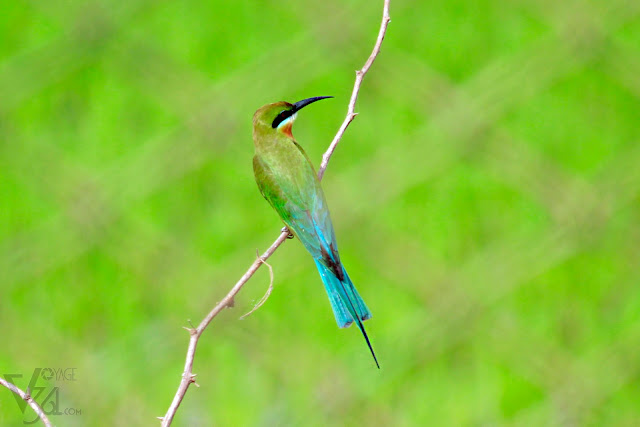 |
| The colorful Blue-tailed bee-eater |
Apart from the water birds and waders I spotted many species of birds, the highlight of the show was the Hoopoe, and a surprise sighting of the Barn Owl, with these two, my long awaited first sighting of these species we're accomplished. Another spectacular sightings were the colorful bee-eaters and Common Iora, along with the Wool neck Stork, which were also my first sightings.
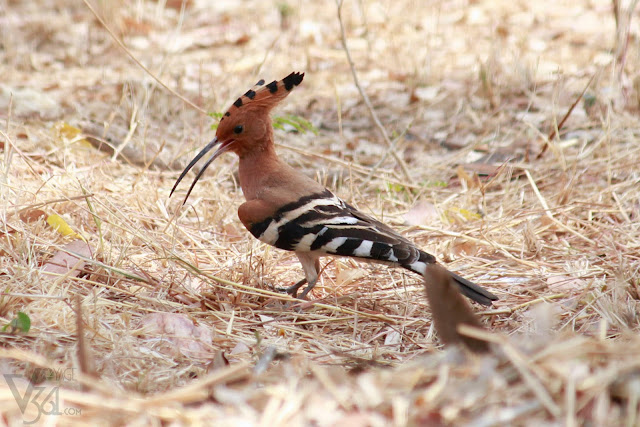 |
| Hoopoe, found patrolling the grounds |
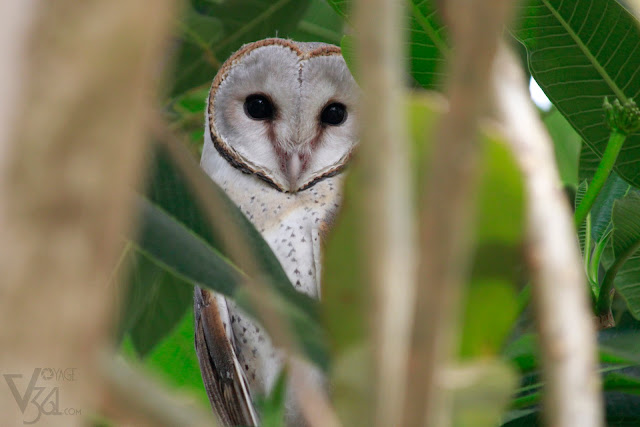 |
| Barn Owl |
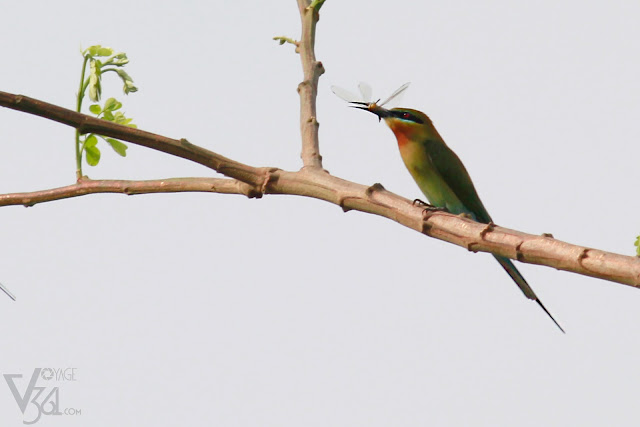 |
| Blue-tailed bee-eater with its favorite food damselfly/dragonfly |
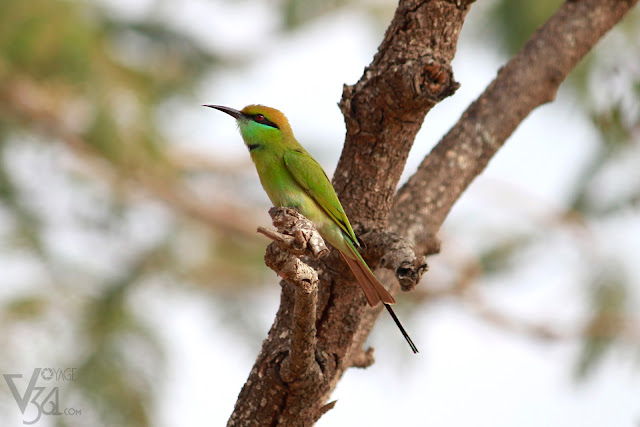 |
| Green bee-eater |
 |
| Common Iora |
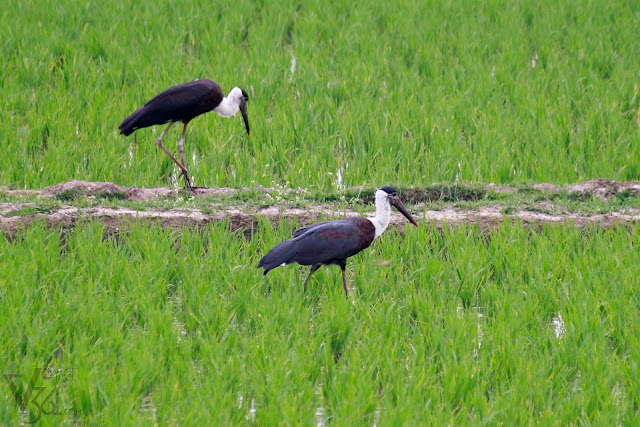 |
| Woolly-necked stork, categorized as vulnerable species under IUCN Red List |
 |
| Large grey babblers seen flipping the muddy layer on the tree in-search of insects |
 |
| Yellow-billed Babbler or White-headed Babbler |
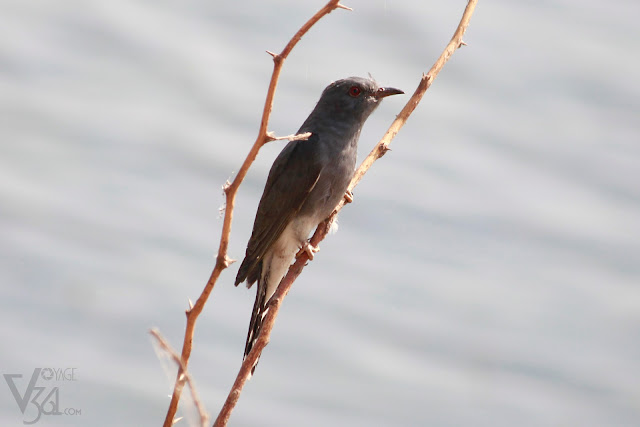 |
| Grey-bellied Cuckoo |
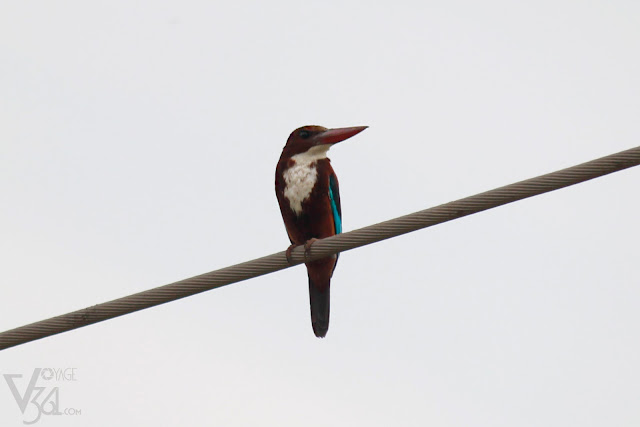 |
| White throated kingfisher |
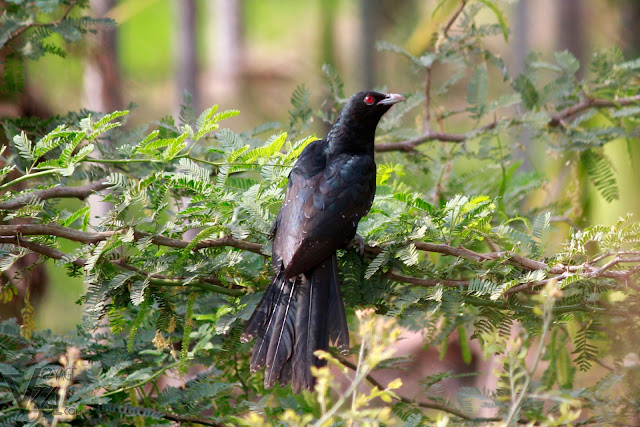 |
| Asian koel male |
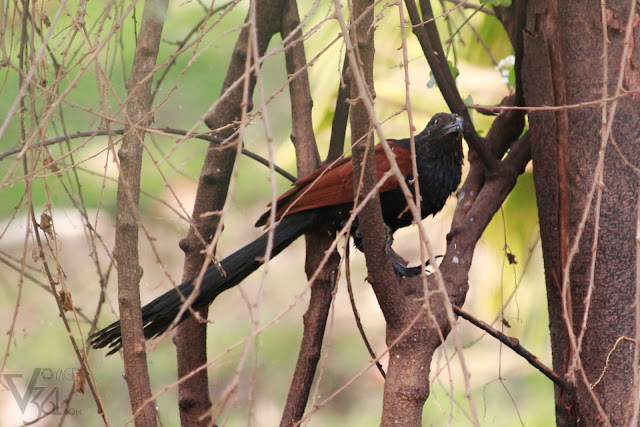 |
| Greater coucal |
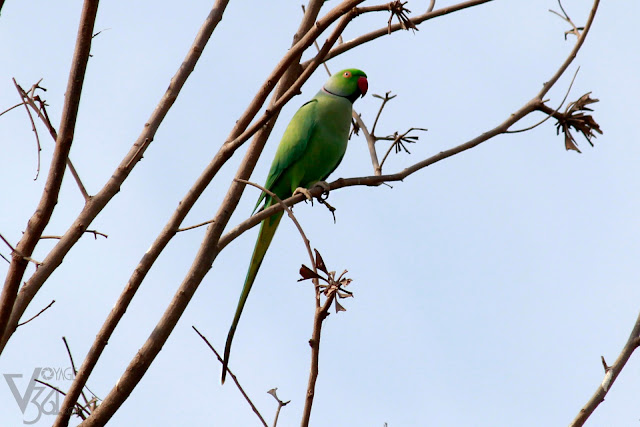 |
| Rose ringed Parakeet male |
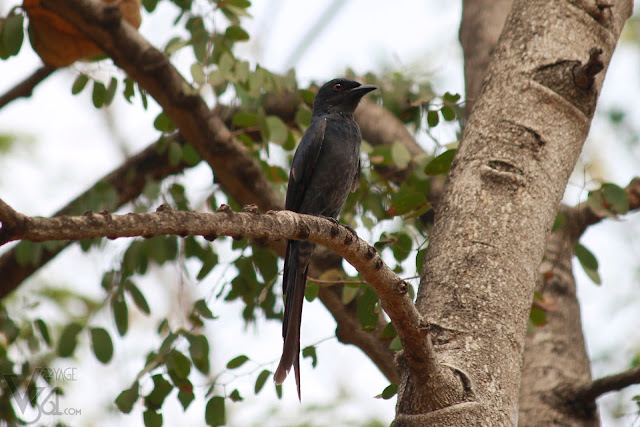 |
| Black Drongo |
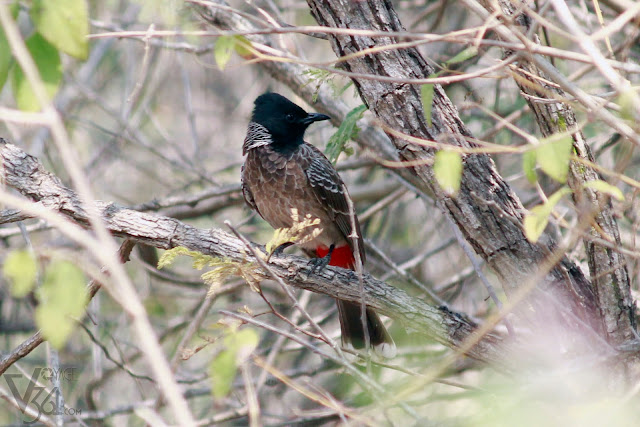 |
| Red-vented bulbul |
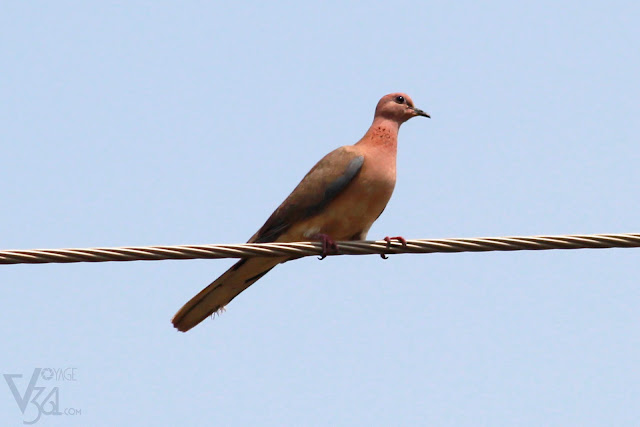 |
| Laughing Dove |
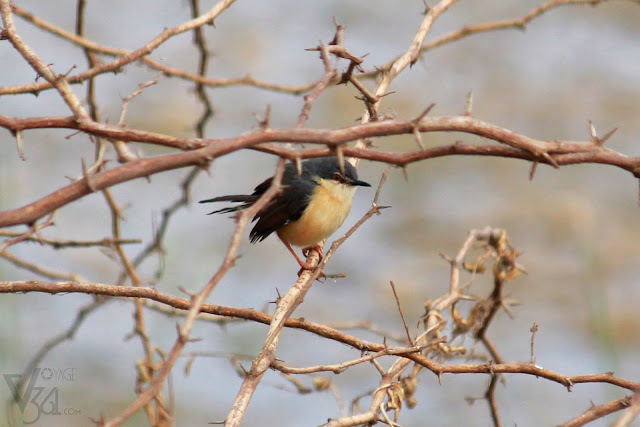 |
| Ashy prinia |
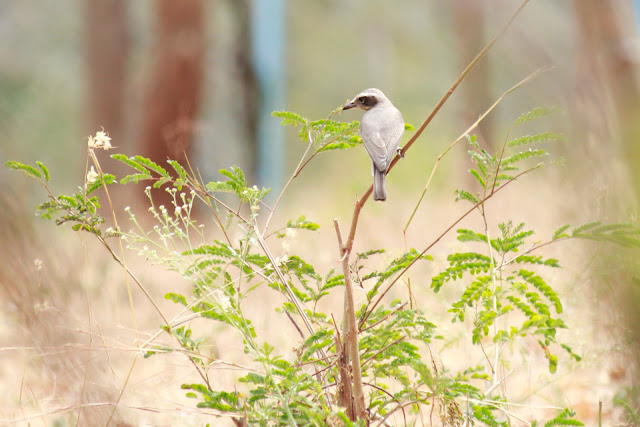 |
| Common woodshrike |
 |
| Green Warbler, considering its color grayish-green above and off-white below |
 |
| Blyth's Reed Warbler, considering the supercilium upto eyes, and yellow lower mandible. With small tail and long undertail covert |
 |
| Booted warbler, Supercilium beyong the eye, short and dark-tipped pale lower-bill. With color pale brown (weak tea colour) above and whitish below with buff flanks |
 |
| Sykes’s warbler, considering the longer tail and supercilium over the eye and not extending beyond |
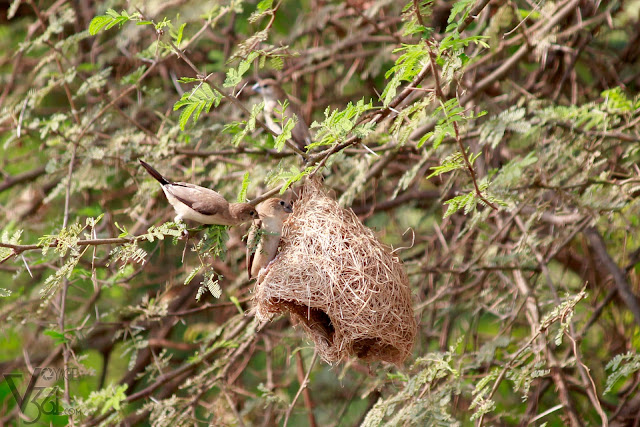 |
| Indian Silverbills or the White-throated Munia in an abandoned weaver bird nest |
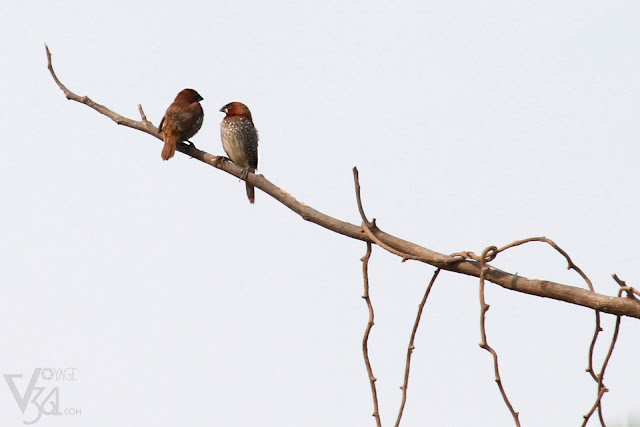 |
| Scaly-breasted Munia |
Complete List of Birds spotted in Davanagere along with the count:
1. Barn Owl : 1
2. Hoopoe : 2
3. White throated kingfisher : many
4. Green bee-eater : many
5. Blue-tailed bee-eater: many
6. Chestnut-tailed Starling : many
7. Large grey babbler : many
8. Yellow-billed Babbler or White-headed Babbler : many
9. Drongo : 6
10. Common Iora : 2
11. Red-vented bulbul : many
12. Greater coucal : 1
13. Asian koel male : 1
14. Grey-bellied Cuckoo : 1
15. Rose ringed Parakeet : 1 pair
16. Red collared dove or Eurasian collared dove : 3
17. Laughing Dove : 2
18. White-browed wagtail : 1
19. Scaly-breasted Munia : 2
20. Indian silverbill / White-throated Munia : 6
21. Indian robin male : 2
22. Ashy prinia : 2
23. Blyth's Reed Warbler
24. Green Warbler
25. Booted warbler
26. Sykes’s warbler
27. Common woodshrike : 1
28. Purple rumped Sunbird : many
29. Pale-billed Flowerpecker : many
30. Braminy Kite : 1
Waders:
31. Little egret : many
32. Intermediate egret : many
33. Cattle egret : many
34. Grey heron : 3
35. Purple heron : 2
36. Pond heron : >5
37. Red wattled lapwing : >5
38. Bronze-winged jacana : >25
39. Pheasant-tailed jacana : 5
40. Black-winged Stilt : >30
41. Wood Sandpiper : 5-10
42. Common Sandpiper : 5-10
43. Green Sandpiper : many
44. Wool neck Stork : 6
Water birds:
45. Spot Billed duck : >100's
46. Garganey : many
47. Northern Shoveler : many
48. Cotton pygmy-goose : many
49. Common coot : >100's
50. Common Moorhen: many
51. Purple swamphen : >50
52. Little grebe : many
53. Cormorant : >100
And the common birds...
54. Common myna : many
55. Jungle myna : many
56. Rock pigeons : >100
57. Crow : many
Comments
Post a Comment